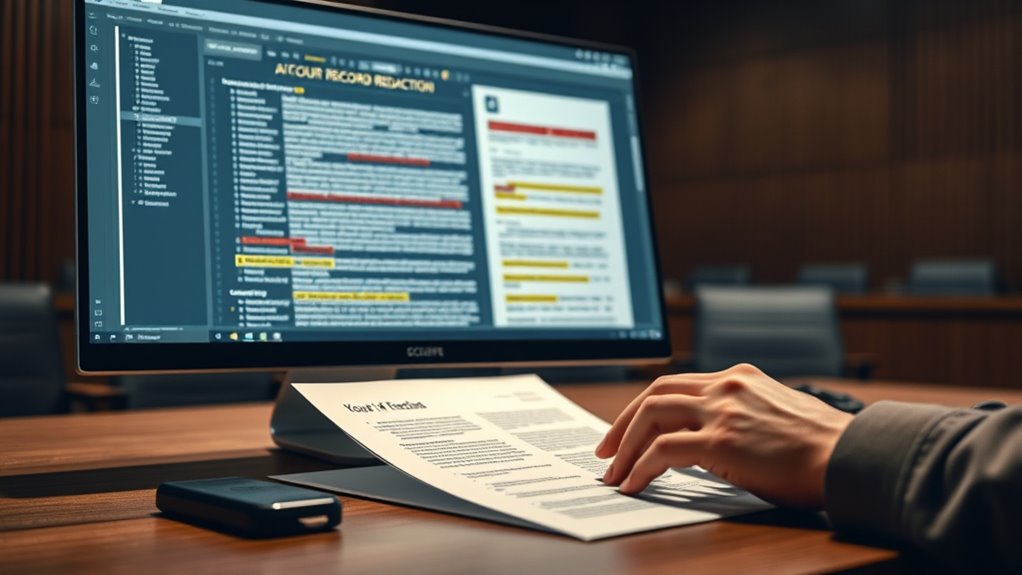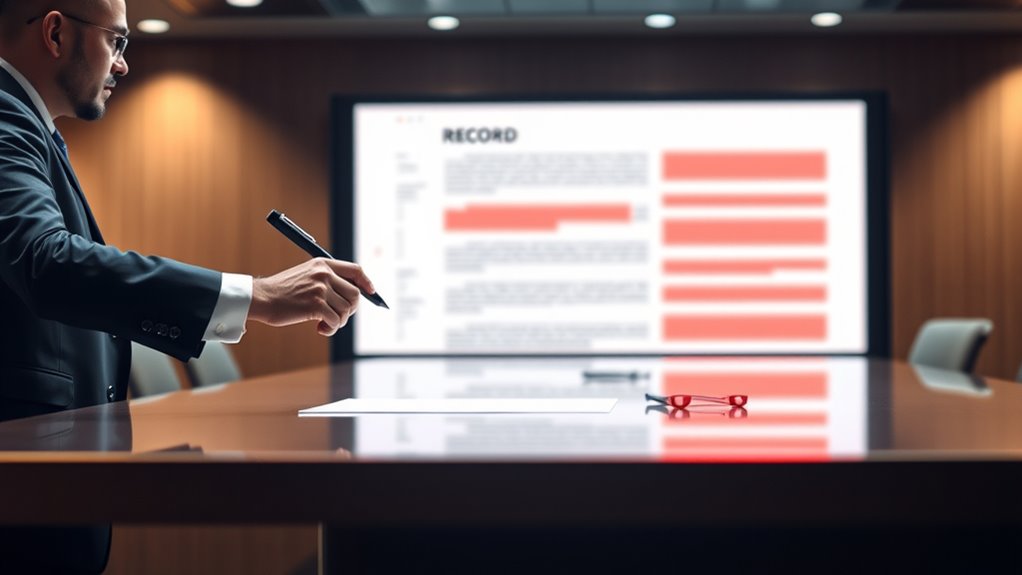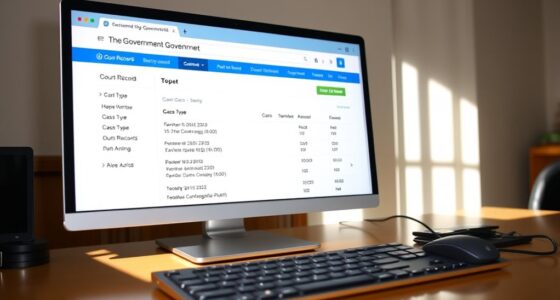AI tools speed up court record redaction by automatically identifying sensitive information like Social Security numbers, addresses, and financial details using advanced NLP and machine learning. This automation reduces the time you spend on manual review, minimizes human errors, and guarantees consistent redaction according to legal standards. With continuous learning capabilities, these tools adapt to new data types and regulations. Keep exploring how these innovations can transform your workflow for even greater efficiency and security.
Key Takeaways
- AI analyzes court records quickly using NLP and ML to identify sensitive information such as SSNs and addresses.
- Automated tools significantly reduce review time compared to manual redaction processes.
- AI minimizes human errors, ensuring consistent and compliant redaction across large volumes of documents.
- Continuous learning allows AI to adapt to new data types and evolving legal standards, speeding up updates.
- Integration of AI streamlines workflows, enhances data security, and accelerates the overall redaction process.

Have you ever wondered how sensitive information in court records is protected before they become public? It’s a pivotal part of maintaining privacy concerns and ensuring legal compliance. Court record redaction is the process of removing or obscuring personally identifiable information and sensitive data from legal documents before they’re accessible to the public. Traditionally, this task was manual, labor-intensive, and prone to errors, which could lead to privacy breaches or non-compliance with legal standards. However, advancements in AI tools are transforming this process, making it faster, more accurate, and reliable.
AI-powered redaction tools analyze court records to identify information that needs to be protected, such as social security numbers, addresses, phone numbers, and financial details. These tools use natural language processing and machine learning algorithms to scan documents swiftly, reducing the time it takes to review and redact data manually. This automation not only speeds up the process but also minimizes human error, which is essential for maintaining legal compliance. When sensitive information slips through, it can lead to serious privacy concerns, legal penalties, or compromised security for individuals involved in the case.
AI tools quickly identify and redact sensitive court data, reducing errors and ensuring legal privacy compliance.
Using AI for redaction also helps guarantee consistency across large volumes of records. Manual redaction can be inconsistent, especially when multiple reviewers are involved, leading to gaps or over-redaction that hampers the usability of records. AI tools follow predefined rules and patterns, ensuring that all relevant data is uniformly protected without removing essential information needed for transparency and legal processes. This balance between privacy concerns and openness is indispensable for a fair judicial system, and AI helps strike that balance more effectively.
Moreover, AI-driven redaction systems are continually learning and improving. They adapt to new types of data and evolving privacy standards, keeping organizations compliant with changing legal requirements. This ongoing improvement reduces the risk of non-compliance, which could otherwise result in legal action or sanctions. By automating complex aspects of the redaction process, these tools free up human reviewers to focus on more nuanced tasks, such as reviewing ambiguous cases or handling sensitive cases that require expert judgment.
In essence, AI tools are revolutionizing court record redaction by providing a faster, more precise way to protect privacy concerns and uphold legal compliance. They streamline workflows, reduce errors, and guarantee that sensitive information remains confidential until records are ready for public access. As technology continues to advance, you can expect even more efficient and secure methods to safeguard privacy while maintaining transparency in the justice system.
AI tools are also being integrated into broader cybersecurity strategies to defend against data breaches and unauthorized access, further emphasizing their importance in data protection and compliance efforts.
Frequently Asked Questions
How Accurate Are AI Redaction Tools Compared to Manual Review?
You might wonder how accurate AI redaction tools are versus manual review. While AI often offers high accuracy and speeds up the process, privacy concerns and ethical considerations still matter. AI can miss sensitive info or make errors, so human oversight remains essential. You should balance AI efficiency with careful review to guarantee privacy is protected, and ethical standards are maintained, especially in sensitive court record redaction tasks.
Can AI Reliably Redact Sensitive Information in Handwritten Court Records?
Like a lighthouse guiding ships through fog, AI can often reliably redact sensitive info in handwritten records, but data ambiguity remains a challenge. Handwritten accuracy varies, and AI tools may struggle with unclear or messy writing. While they speed up the process, you should still review to make sure all sensitive info is properly protected. Relying solely on AI might risk missing critical details, so a mix of automation and manual oversight works best.
What Are the Legal Implications of AI Redaction Errors?
You should consider the legal implications of AI redaction errors, as liability concerns could arise if sensitive information is exposed due to mistakes. These errors raise ethical considerations about privacy and accuracy, especially in legal contexts. If an AI tool fails, you might face lawsuits or sanctions, so it’s essential to assess the reliability of the technology and implement safeguards to minimize risks and guarantee compliance with privacy laws.
How Do AI Tools Handle Complex or Ambiguous Data?
You might worry AI tools struggle with complex or ambiguous data, but they excel through contextual interpretation and ambiguity resolution. They analyze surrounding text and patterns to interpret nuanced details accurately. While human oversight remains essential for tricky cases, AI rapidly processes intricate information, reducing errors and saving time. This combination guarantees efficient handling of complex data, making redaction more precise and reliable without sacrificing speed.
What Are the Costs Associated With Implementing AI Redaction Solutions?
When considering AI redaction solutions, you’ll need to do a thorough cost analysis to understand the expenses involved. Implementation challenges, such as integrating AI with existing systems and training staff, can add to costs. While upfront investments might seem high, the long-term savings through faster, more accurate redaction are significant. Be prepared for ongoing maintenance and updates, which also influence your overall costs.
Conclusion
Think of AI tools as your trusty compass in a vast, tangled forest of court records. They cut through the thick underbrush of sensitive information, guiding you swiftly and safely to clear paths. With AI as your guide, you avoid getting lost in tedious manual redactions, reaching your destination faster. Just like a skilled explorer, you’ll navigate the process with confidence, ensuring privacy and efficiency walk hand-in-hand on your journey through the legal wilderness.









